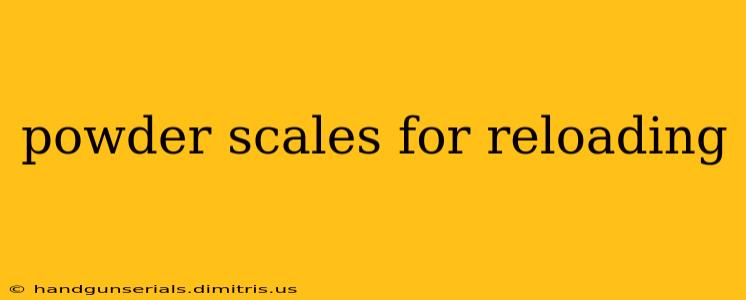Reloading ammunition is a precise process demanding accuracy at every step. Using a reliable powder scale is paramount for ensuring consistent and safe cartridge performance. This guide dives deep into the world of powder scales, helping you choose the right one for your reloading needs and practices. We'll cover different types, key features, and crucial safety considerations.
Types of Powder Scales
Several types of powder scales cater to various reloading budgets and experience levels. Understanding their differences is key to making an informed purchase:
1. Mechanical Powder Scales:
These classic scales utilize a beam balance system and are generally less expensive than digital options. While providing decent accuracy for many reloaders, they require more meticulous handling and a steady hand. Their simplicity also means fewer potential points of failure.
- Pros: Affordable, simple operation, durable.
- Cons: Slower measuring process, prone to slight variations based on environmental factors (temperature, drafts), requires careful calibration.
2. Digital Powder Scales:
Digital scales boast superior accuracy and speed compared to mechanical versions. They often feature a variety of units (grains, grams), automatic calibration, and tare functions, enhancing efficiency.
- Pros: Fast and precise measurements, user-friendly interface, various features (tare, auto-calibration), often include data logging capabilities.
- Cons: Generally more expensive, potential for electronic failure, reliance on batteries.
3. Benchtop Powder Scales:
For serious reloaders with a high volume of ammunition production, benchtop scales provide a stable, robust platform for consistent weighing. Their larger size and features enhance accuracy and efficiency, particularly when dealing with larger quantities of powder.
- Pros: Highly accurate, stable platform, often incorporates advanced features.
- Cons: Significant space requirement, higher price point.
Key Features to Consider
Regardless of the type, several features significantly impact the performance and usability of your powder scale:
- Accuracy: Look for scales with a high degree of precision, typically expressed in increments of 0.1 grain or less.
- Capacity: Ensure the scale's capacity exceeds your maximum powder charge weight.
- Calibration: Regular calibration is crucial for maintaining accuracy. Opt for scales with easy calibration procedures. Some digital scales offer auto-calibration.
- Tare Function: This essential feature allows you to zero out the weight of a container, providing accurate powder weight readings directly.
- Stability: A stable base is vital, especially for mechanical scales. Look for a sturdy platform or consider a dedicated scale stand.
- Data Logging: Some digital scales store weighing data, useful for tracking powder charges and maintaining consistent loads.
Safety Precautions:
Handling gunpowder demands strict adherence to safety protocols. Here are some vital considerations:
- Always Ground Yourself: Static electricity can ignite gunpowder. Ground yourself before handling powder or using your scale.
- Proper Workspace: Maintain a clean and organized workspace, free from flammable materials.
- Avoid Static-Generating Materials: Use non-static materials when handling powder and using your scale.
- Regular Calibration: Inaccurate powder charges are dangerous. Calibrate your scale regularly according to the manufacturer's instructions.
- Double Check Your Charges: Always double-check your powder charges before seating the bullet.
Choosing the Right Scale:
Selecting the optimal powder scale depends on your individual needs and budget. Beginners might find a reliable mechanical scale sufficient, while experienced reloaders might prefer the speed and precision of a digital benchtop scale. Consider your reloading volume, budget, and desired level of accuracy when making your decision.
Conclusion:
Investing in a high-quality powder scale is an investment in the safety and accuracy of your reloading process. By understanding the different types of scales and their key features, you can choose the best option to meet your needs and ensure consistent, safe ammunition for your shooting activities. Remember, always prioritize safety and follow best practices.

